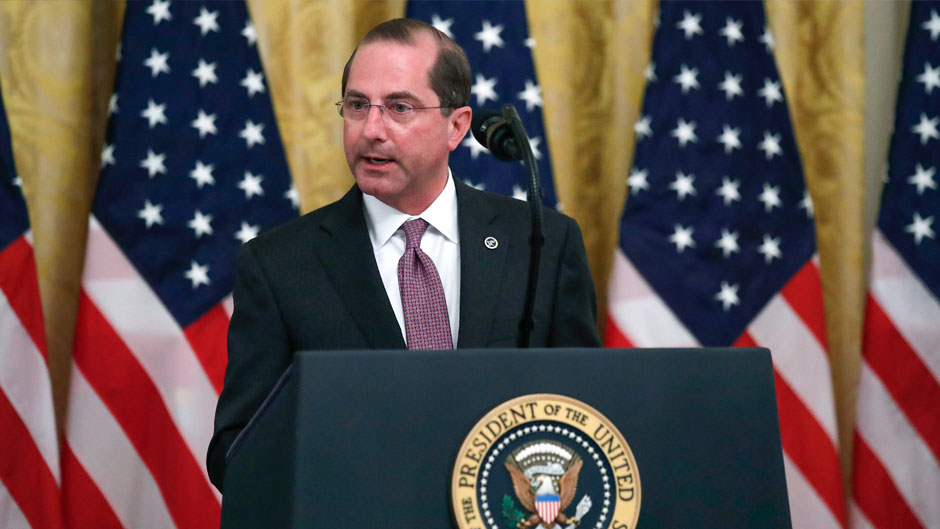Speaking to a University of Miami Patti and Allan Herbert Business School audience, U.S. Secretary of Health and Human Services Alex Azar answered questions from Dean John Quelch and attendees about his leadership development, the administration’s response to the pandemic nationally and in Latin America, and his achievements these past 20 months in guiding the U.S. Department of Health and Human Services.
The secretary recognized that the pandemic has placed enormous stress on the U.S. health care system and exposed certain fragilities. He pointed to four key insights related to testing, stockpiles, public-private partnerships, and data the administration has gleaned recently that could support a better response to a future pandemic.
“No testing infrastructure existed for a virus like this, and one of the key learnings has been that we had to build the system from the ground up,” Azar said.
In terms of supplies, he said that the deep dependence on China for personal protection equipment (PPE) such as surgical gloves, masks, gowns, and materials had to be addressed.
“We’ve been leading a complete reconception of our strategic national stockpile to bring that production back to our hemisphere, especially to the U.S., but frankly we’re open to our partners in this hemisphere also standing up the kind of production that supplies U.S. needs,” said Azar. He explained that the existing material stockpile was geared more toward biomedical chemical counter measures, with “a very small amount of health system PPE for small dislocations like a hurricane—nothing on a national scale.”
The push for a COVID-19 vaccine has highlighted the importance of public-private partnership.
“We’ve really seen how vital that is to vaccine development,” Azar said, “and perhaps we should be thinking in the future about mechanisms of scale in the hemisphere for better collaboration there for public-private partnerships for future pandemics.
He identified the fourth insight as the need for more efficient use of public health data “so that the Centers for Disease Control, instead of being simply the gatherer of unique proprietary data, becomes a data warehouse aggregator of all data available in the U.S. around public health, applying a unique national and international perspective and then applying the world’s best analytics on top of that,” he said.“That’s going to be the trend for data in the future.”
In January 2018, Azar returned to head the department where he served as general counsel from 2001 to 2005 and as deputy secretary from 2005 to 2007. A graduate of Yale Law School, he worked as a corporate lawyer and from 2007 through 2017 was a senior executive at Eli Lilly and Company in Indianapolis, Indiana.
The secretary said his leadership approach in the department stems from his career as a corporate lawyer, where he benefited from the “intensive self-scrutiny, the 360-degree evaluations, the constant learning and seeking to understand areas of defect.
“One of my passions has always been execution—how to get from A to B and to build systems that can be repeated, to define clear lag measures [timelines] and build a cadence of accountability,” he said. “At its core, that means to lead highly engaged people, a team with a sense of swagger and thirst for winning. Success breeds success, and that delivers long-term sustainability.”
In contrast to his stint as deputy secretary in the 2000s, where his foreign travel and efforts were focused mostly in Europe, Azar said that as secretary these past two years, he has traveled to Latin America more than any other region. Among the biggest concerns there—a scenario set in motion prior to the pandemic—was the collapse of the health system under the Nicolas Maduro regime and the millions who fled Venezuela to spiral into neighboring countries, overwhelming already fragile health care systems.
The secretary pointed to “a key innovation”—a mutually recognized vaccine card that documents vaccines and other health care services—as “a fantastic example of the collaboration” between regional health ministers that the United States has actively supported.
Azar said the Trump administration has been providing supplies and development assistance to help the region address the virus and, likewise, helping the Pan American Health Organization and the International Development Bankrebuild the Latin American health care system.
Asked about his achievements of the past two years, Azar said he was most proud of the advances to restructure the health care system and create a value-based transformation that encourages transparency in terms of price and quality.
“Beginning in January, hospitals will have to be transparent about the prices they charge for their services,” he said. “For the first time, you will have the right to know what some things will cost you. A very large percent of our hospital services are actually shoppable, and we’re going to be doing that similarly for insurance companies and getting that price and quality information transparent.”
The secretary highlighted other reforms that he said have encouraged health care providers to work with patients to achieve better outcomes, including operability—a patient’s ability to move from one health care system to another—and changes made to “antiquated regulatory provisions that kept providers from collaborating with each other.”

